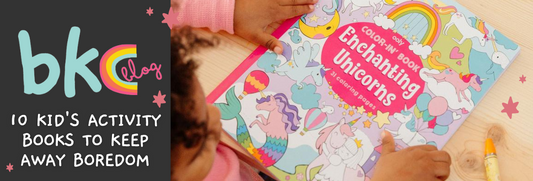As a parent, you likely hope your child will grow up to be a confident adult, with all the tools needed to navigate life. By raising your child as an independent thinker, you will have enabled them with the essential skills to lead life with a sense of confidence and belief in their abilities. Read on to know how to raise independent-thinking children.

As parents, we work hard towards giving our children the best possible environment at home; one that is full of constant and reliable love, attention, and care. But one of the most important roles we must play as primary caregivers is to prepare our kids for the world outside – a world that can often be challenging and hard to navigate.
The best tool to effectively prepare our children for the trials of the world outside the home, and in time, adult life, is independent thinking; that is, the ability to confidently analyse and navigate situations using one’s own judgement, and relying on one’s own opinion and values as opposed to those of others.
But how can one go about inculcating this? Conventional Indian schooling, CBSE in particular, doesn’t offer many opportunities for independent thinking and problem solving. So the solution lies elsewhere. Read on to learn why independent thinking is crucial for children, and how you can help them acquire this essential life skill.
Why Is Independent Thinking Important?
- Promotes Critical Problem-solving Skills

As soon as your child is old enough to go to school they may be presented with small instances on a daily basis where they will have to make decisions on their own without having you to consult. No need to be alarmed – these will likely be minor matters like solving a puzzle, figuring how to share crayons among friends, or how to open an unfamiliar pencil box.
It is important for your child to first of all, feel self-reliant enough to know that they can find a solution on their own, and then to have the patience to brainstorm, ask questions, and come up with a solution. This will also help your child take calls on whether a problem is actually beyond their means and needs adult intervention. These problem-solving skills will serve your child well into their adult years.
- Helps with Processing Information
Independent thinkers don’t receive information passively. They process it based on what they know, but also know when to ask for guidance. Considering our kids are growing up in a digital-first world that is shoving content in their face on all kinds of platforms and in all forms all the time, it’s important that we equip them with the ability to filter through dangerous and misleading information.
As independent thinkers, they will know not to accept everything at face value but examine it based on their experiences and knowledge, as well as analyse its source. Cultivating such a mindset from a young age will serve them richly in their academic and professional lives.
- Builds Self-esteem, Confidence, and Leadership Skills

By helping your child become self-reliant, you will essentially have enabled them to lead life with confidence and self-belief. When faced with unfamiliar challenges, their first instinct will not be to react with fear; instead they will have confidence in their abilities to find solutions on their own. As a parent, by helping your child develop essential life skills, that include social, emotional, and practical, you will have equipped them with abilities that will, in turn, boost their confidence.
With their confidence, self-belief, and concrete abilities, your child will grow up to be a natural leader. They will be an asset to any team as they will be forthcoming with their ideas, while also having the self-awareness to know when they need to step back or seek guidance.
- Encourages Determination, Motivation, and Persistence
Independent thinkers are not deterred by failure. When they have a task at hand, they work at it with dedication and persistence. This focus and determination is something that can be inculcated in a child. With such a mindset, your child will single-mindedly persist with projects and activities, even when they are challenging.
As parents, it is important for you to teach your child that failure is part of the process. When they face setbacks and are lacking in motivation, remind them what they enjoyed about the activity and of instances when they have succeeded after failed attempts. If their setbacks have occurred because of a mistake they made, reassure them that there’s much to learn from mistakes, and making them is the only way to grow.
How to Inculcate Independent Thinking
1. Assign Age-appropriate Chores
Doing chores at home goes a long way towards building independence in kids. Just make sure you’re assigning chores that your child is developmentally ready for. For younger children, an appropriate chore may be putting away toys, wiping down a table or chair, or putting soiled clothes in a laundry hamper. For older ones, encourage chores like arranging their bookshelf, setting the table, making their bed, putting dishes in the sink, or perhaps even preparing a simple meal (these cute aprons may just be the perfect incentive for kitchen-inclined kids).

Doing chores has many, many benefits for children. It teaches them what it means to take care of themselves or the home. It gives them a feeling of accomplishment, thereby boosting self-esteem. It also teaches them to problem-solve independently, and work towards achieving efficiencies all on their own.
2. Encourage Reading Different Perspectives
It’s a no-brainer that reading is good for kids. But reading a wide range of viewpoints, say to do with gender, race, or religion, can really help open up a young mind. It can teach a child to not take narratives at face value, and to always question, assimilate, and use their own judgement to draw conclusions. This is especially important in the context of traditional Indian schooling, which tends to reward linear thinking and has little room for critical or creative thought. Here are a few books we recommend for sparking independent thought in kids:

i) Good Girls Don't Make History: Appropriate for kids aged 10 and up, this beautifully illustrated graphic novel revolves around the fight for women's voting rights in the United States. A great introduction to a side of history that your kid may not encounter in their school history books.
Buy Now

ii) Lift-the-flap Questions & Answers about Racism: Perfect for 7- to 9-year-olds, this Usborne book raises some tough questions and addresses them in a thought-provoking way. The illustrations are captivating and the text, easy-to-understand. There’s also a version for 4- to 7-year-olds. Check it out here.
Buy Now

iii) This Is My Dad: This heart-warming story teaches young children about family dynamics and inclusivity. Not all families look the same, and many children face difficulty finding acceptance in school when faced with questions about their family. House of Many is another book that tackles this subject with great tact and imagination.
Buy Now
3. Allow Independent Play
Strong independent-thinkers are also highly creative. To nurture your child’s creativity provide them avenues to engage in imaginative play. This could mean dressing up as a made-up character, pretending they live in a circus or a farm, or going on an adventure aboard a pirate ship. Encourage and challenge your child by asking them questions about their created world and characters. This will help them push the boundaries of their imagination as well as rational thinking.

With your child engaged in imaginative play, they will be less inclined to spend time in front of screens. We highly recommend trying Unplugged Play: Grade School: 216 Activities & Games for Ages 6-10 for helpful prompts to encourage play. For younger children, we encourage you to check out this blog.
4. Inspire Your Child to Write
Writing, as an activity, requires a great deal of patience, determination, and creativity. It is a medium through which your child can find an independent voice of their own. Help your child with fun, age-appropriate prompts, and then let them express themselves the way that comes naturally to them. For a young child, it could be a poem about an imaginary friend from a magical world, or a bedtime story of their own invention. Perhaps some cute, colourful notebooks, pens, and stickers will help spark your child’s imagination!
Even better, you can encourage your child to keep a journal – an entirely personal space for them to express their life story. Researchers have found that journaling is a tremendously beneficial tool for child development. Journals such as You Are the Magic You Seek and the Gratitude Journal could offer your child a space for introspection and self-analysis.
5. Encourage Curiosity and Discussions
It is sad but true that children lose their innate curiosity with age. Much of that is because the world prescribes them what to think rather than nurturing that curiosity. As a parent, you can keep that fire alive by acknowledging their curiosity through meaningful answers. You can take it a step forward by engaging them in discussion. Ask them where they think the Sun goes every evening, and then explain what actually happens. Your thoughtful responses will encourage them to continue seeking knowledge and asking questions.

Now, this one may be a hard pill to swallow but it is important that you allow your child to disagree with you as well. Involve your child in family discussions about chores or rules, and ask for their opinion. As long as they engage in the discussion respectfully and offer their rationale, allow them to disagree and settle matters in mutual agreement. Not only will these skills come in handy should your child enter debate competitions, they will improve their interpersonal skills greatly by learning at a young age that discussions and arguments are not the same.
6. Interacting with New and Different People
It is important to teach your child to be receptive to different worldviews, cultures, and experiences. To grow into an independent thinker, it is not enough to be confident in your own opinions but also to be open to different points of view and possibilities. For this, encourage your child to play with children from differing backgrounds.
If possible, expose your child to various cultures and social practices through travel. Learning about differences will teach your child that there are many different ways to think, which will only strengthen them as an independent thinker.
Teach your child that having their own voice is as important as listening and being receptive to other beliefs, as this will enable them to be a part of many enriching discussions.
7. Allow Freedom to Make Mistakes
Possibly the saddest way to crush a child’s confidence and independent spirit is to make them feel embarrassed or shameful when they make mistakes. Instead, your child should feel safe to try various methods and solutions to a problem, so they can learn from experience. Shaming any child for making mistakes will only make them hesitant and unsure of their abilities, intellect, and participating in team activities.

So if your child makes mistakes, such as misspellings or misunderstanding an assignment for homework, praise their effort, gently correct them, and encourage them to try again. Assure your child that they have done no wrong by making a mistake and that it’s an opportunity for them to learn. Show you have confidence in their abilities and decision-making skills by giving them space when they are engaged in an activity. If you normally sit with them for homework, start putting some distance gradually; let them know you are still available for help should they need you.
By not being over-involved (i.e. helicopter parents), they will learn to develop a sense of pride and ownership in their work as well as be willing to take initiative on new challenges.
Oftentimes, it can be difficult for parents to step back and let their little one stumble and fall without swooping in for a rescue. Surely, it’s any parent’s instinct to want to protect their children from all harm. But all that may achieve is to either make your child too rebellious against you or too fearful of the world. Instead, teach them the tools, take a step back, let them make mistakes and learn from them, and confidently share their individuality with the world.





